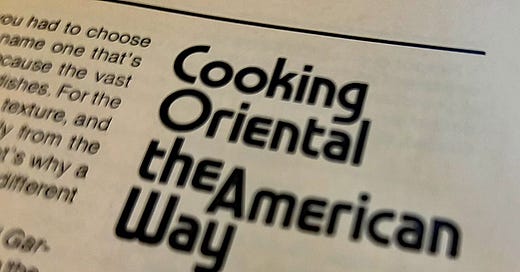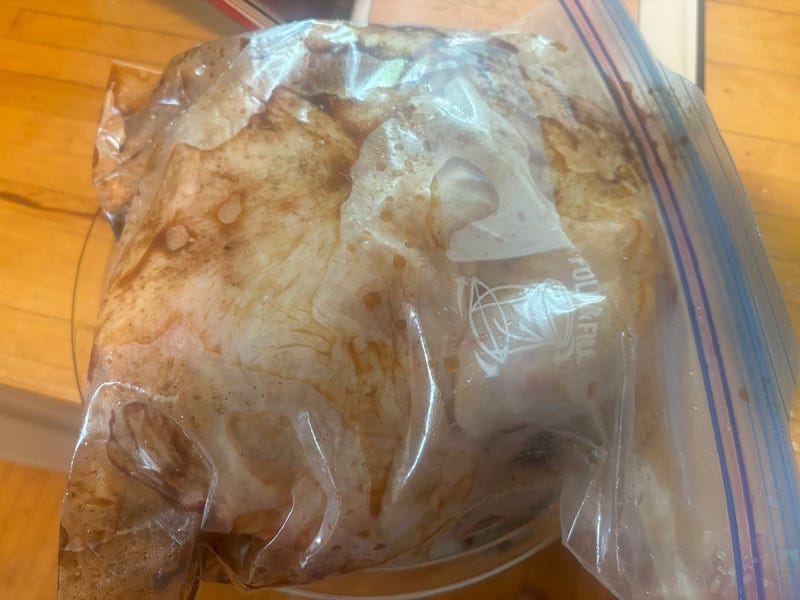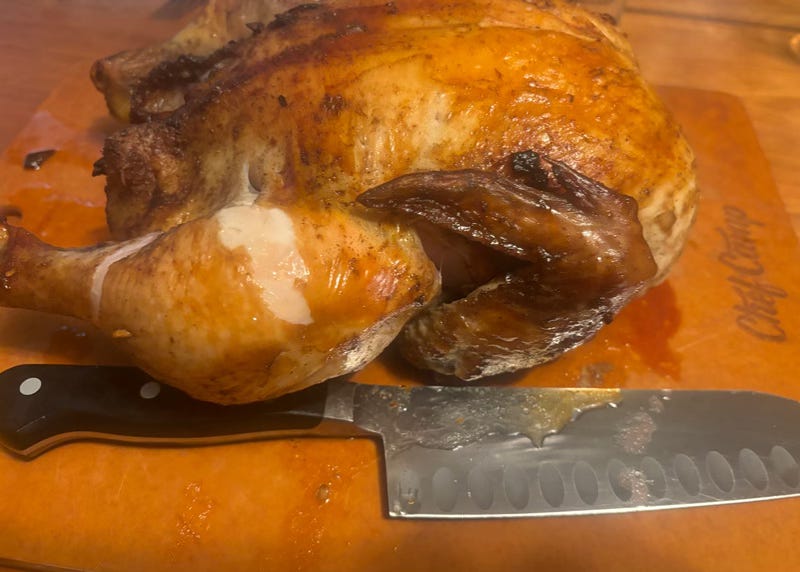THE COOKBOOK TEST #0047: THE ORIENTAL COOK BOOK
INSTALLMENT #0047 (FREE) MY TRIP TO HELL / ON "ORIENTAL," A NON-HELPFUL WORD / THE WORLD'S MOST ORDINARY CHICKEN / DUMP THAT DESSERT
Dear Subscribers,
If I end up in Hell after I die, one of the first things I'm going to do is look up the authors of the ORIENTAL COOK BOOK and start yelling at them. Why am I so confident that I'll find the authors in Hell? Because their recipe for fortune cookies is so completely and utterly bad that its creation and publication is a straight up Evil Act. I suppose its possible that they led otherwise decent lives and they're working the time off in Purgatory, but even then I feel confident that they'll be stuck there long enough that I'll have a chance to holler at them.
But enough about that... for now. It's time for a quick introduction of this week's book, the Oriental Cook Book by the editorial team of Better Homes and Gardens magazines. I never, ever, judge a book by its cover, and I picked this bad boy up at an antique store fully ready to be surprised by its thoughtfulness (for the time), culinary seriousness, and creativity. Beyond that, I was hoping to use it as something of a bookend with contemporary Asian culinary works such as Coconut & Sambal to do a little bit of a compare and contrast exercise.
Compare and contrast I can: Coconut & Sambal is a powerful, nuanced, skillfully written work of recipes and culture writing. In terms of both technique and ingredients, it stretches way beyond American methods to present cookery that is truly reflective of specific places in Asia. The Oriental Cook Book is a dry, flat turd thinly compressed between two cardboard covers.
Perhaps the most pure expression of this book comes in its own introduction:
Obviously, there are two looming problems with this overall frame. The first is that "Oriental" frame (which is introduced as Chinese, Korean and/or Japanese) is an attempt to group together and flatten out a culinary topography so rich and disparate that you'd need a solid 15-20 cookbooks to just get started on the high-level basics. Think about the vast size of China, and the contrasts, for example, between Cantonese and Szechuan and Shandong- and Hunan-style food. That's not even the extent of it, there are at least eight widely recognized Chinese cuisines, but even that number can be subdivided with a bit of research and elbow grease. Oh, and yeah: Korean food is a thing. And the Japanese are known to cook a bit.
So what the Oriental Cook Book is really presenting is the "American Way" part of the mission statement. And what that boils down to are a lot of recipes that look like the menus of Chinese-American neighborhood restaurants from the mid-1970s: beef wontons, sweet and sour riblets, stir fries, and Kung Pao, plus some Japanese 101 entries like sukiyaki and tempura. But this book won’t even help you cook Chinese-American neighborhood fare with flair and skill, as we’re about to discover.
at your service,
James
THE ORIENTAL COOK BOOK
BETTER HOMES AND GARDENS
MEREDITH CORPORATION | 1977
The rule of thumb for "oriental" when I was growing up was: it's OK for rugs and vases, but not for people. But at this point, I don't think it's good for anything. (Edward Said wrote Orientalism in 1978, so I guess the authors of the Oriental Cook Book get a partial pass, but the writing was already on the wall.)
One of the problems with "oriental" for even non-person entities is that it implies there is some useful meaning in the term, for otherwise it wouldn't exist. But there really isn't anything useful about it, beyond the broad-as-Jupiter stereotype of it meaning "not European."
But culture can't and won't be painted by broad brushes - there is trade, and fusion, and intermarriage, and colonialism, and immigration, and factionalism, and religious diversity, and esoteric local traditions, and a thousand more reasons that "Oriental" makes absolutely no sense as an adjective. If a word means everything, it means nothing.
Plus, there are a few howlers in the Oriental Cook Book that I'm not sure would've been well-received even in the 1970s:
Thanks for inventing the hibachi, the Orientals!
THE WORLD'S MOST ORDINARY CHICKEN
I try to approach reviewing like Columbo approaches a possible murder case: thoughtfully, with an open mind, both reasonably cheerful and skeptically prepared for the worst. I legitimately want to like, if not love, everything I cook. So when I hunted down a main recipe to tackle from the Oriental Cookbook, I looked for something with a bit of a wow factor that was guaranteed to have a bold, pleasing flavor.
I landed on Soy-Glazed Chicken, which boasted a flavorful marinade and, while a fairly simple preparation, could potentially be worth adding to a weeknight rotation if it was pleasant enough to eat.
I noticed a couple things about the recipe right away. One is that the marinade included chopped onions. Let me tell you what putting some chopped raw onions next to a chicken for a couple hours is going to do: absolutely nothing. That's not such a big problem by itself, other than the wasted work and wasted onion, but it's a sign that the recipe author doesn't know or care what's going on.
The second thing I noticed is that the main flavor driver, Chinese Five Spice, was included at a paltry 1 tsp for an entire 4-5 pound roast chicken. I doubled it, wanting to give this thing a fighting chance.
The marinade (mostly soy sauce and garlic) was easy to whip up, and the roasting instructions couldn't have been simpler: 90 minutes at 375 F. Soon enough, the chicken was ready to eat.
The most remarkable thing about the Oriental Cook Book's Soy-Glazed Chicken is how unremarkable it is. The final chicken emerged from the oven tasting like... a roasted chicken. Not a badly roasted chicken or an unpleasant roasted chicken, but a chicken with only a hint of distinctive flavor that was isolated to the skin. Carved up and served on white rice, it risked losing out to the rice in terms of intensity of flavor.
I'm not including the recipe here because your life is too short to waste with this beige nonsense.
MISFORTUNE COOKIES
I don't even know where to begin with this recipe. (I thought about dropping the F-bomb here, but I don't typically swear in THE COOKBOOK TEST and I'm not going to let this cookbook break me.)
My wife sometimes makes fortune cookies, and her recipe uses egg whites and some butter and cream to make something elastic that’s fairly close to a tuile - ideal for the half moon fold followed by bowl-edge bend that gives fortune cookies their distinctive shape.
Here's the Oriental Cook Book recipe:
Notice anything? Oh, yes, it's definitely missing the almond flavoring. But it's also filled out by water, cornstarch, and oil, not cream and butter, and you might worry that it's going to yield something like a nasty pancake rather than a neat, foldable cookie base.
And that's what you get. My first attempt, I thought maybe my batter was simply too thick - it didn't really spread out to a circular shape.
But subsequent attempts with added water didn't help - even if the batter spread more readily, it didn't fold, it didn't brown evenly, and it sure as hell didn't taste like a fortune cookie.
This recipe is ass. It doesn't work as written, and it can't even work if tweaked and modified. In fact, it never worked. It's toxic garbage. It's something you pass along to someone who stole the love of your life, convinced them to drop out of grad school, moved them halfway around the world, and then cheated on them with an investment banker.
I do not like this recipe.
THE VERDICT ON THE ORIENTAL COOK BOOK
(BUY IT / BORROW IT / SKIP IT / ***SCRAP IT***)
The Oriental Cook Book is going to go right back into the $4 used book ecosystem from whence it emerged, unless Half Price Books won't take it, in which case I guess it will end its miserable run after nearly a half century of cursed existence.












Ha! Yeah, that’s all fair. In my defense, being frustrated by horrible recipes IS sort of fun, in that a big result is more exciting than a mixed result. It’s like with reviews - I never go out looking for spectacular bombs, but when I stumble upon them, they’re a joy to write…
Is there such a thing as a mind that is TOO open?
Those cookies made me think of the times when I'm hollering at holey pie dough or underbaked cakes or something and Patrick pipes up: "Isn't this supposed to be fun?"